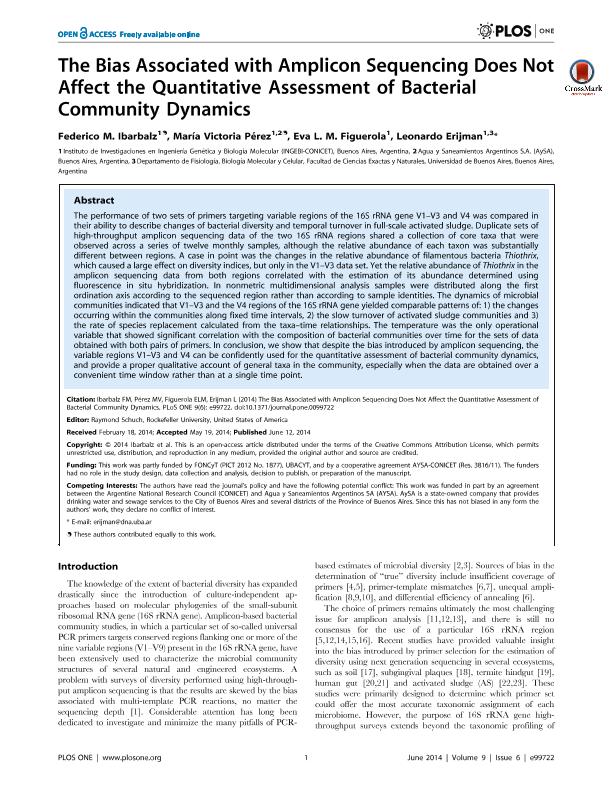Mostrar el registro sencillo del ítem
dc.contributor.author
Ibarbalz, Federico Matias

dc.contributor.author
Perez, María Victoria

dc.contributor.author
Figuerola, Eva Lucia Margarita

dc.contributor.author
Erijman, Leonardo

dc.date.available
2018-01-26T17:30:58Z
dc.date.issued
2014-06
dc.identifier.citation
Ibarbalz, Federico Matias; Perez, María Victoria; Figuerola, Eva Lucia Margarita; Erijman, Leonardo; The Bias Associated with Amplicon Sequencing Does Not Affect the Quantitative Assessment of Bacterial Community Dynamics; Public Library of Science; Plos One; 9; 6; 6-2014; 1-12; e99722
dc.identifier.issn
1932-6203
dc.identifier.uri
http://hdl.handle.net/11336/34697
dc.description.abstract
The performance of two sets of primers targeting variable regions of the 16S rRNA gene V1-V3 and V4 was compared in their ability to describe changes of bacterial diversity and temporal turnover in full-scale activated sludge. Duplicate sets of high-throughput amplicon sequencing data of the two 16S rRNA regions shared a collection of core taxa that were observed across a series of twelve monthly samples, although the relative abundance of each taxon was substantially different between regions. A case in point was the changes in the relative abundance of filamentous bacteria Thiothrix, which caused a large effect on diversity indices, but only in the V1-V3 data set. Yet the relative abundance of Thiothrix in the amplicon sequencing data from both regions correlated with the estimation of its abundance determined using fluorescence in situ hybridization. In nonmetric multidimensional analysis samples were distributed along the first ordination axis according to the sequenced region rather than according to sample identities. The dynamics of microbial communities indicated that V1-V3 and the V4 regions of the 16S rRNA gene yielded comparable patterns of: 1) the changes occurring within the communities along fixed time intervals, 2) the slow turnover of activated sludge communities and 3) the rate of species replacement calculated from the taxa-time relationships. The temperature was the only operational variable that showed significant correlation with the composition of bacterial communities over time for the sets of data obtained with both pairs of primers. In conclusion, we show that despite the bias introduced by amplicon sequencing, the variable regions V1-V3 and V4 can be confidently used for the quantitative assessment of bacterial community dynamics, and provide a proper qualitative account of general taxa in the community, especially when the data are obtained over a convenient time window rather than at a single time point.
dc.format
application/pdf
dc.language.iso
eng
dc.publisher
Public Library of Science

dc.rights
info:eu-repo/semantics/openAccess
dc.rights.uri
https://creativecommons.org/licenses/by/2.5/ar/
dc.subject
Amplicon Sequencing
dc.subject
Primer Bias
dc.subject
Activated Sludge
dc.subject
Bacterial Community Dynamics
dc.subject.classification
Bioremediación, Diagnóstico Biotecnológico en Gestión Medioambiental

dc.subject.classification
Biotecnología del Medio Ambiente

dc.subject.classification
INGENIERÍAS Y TECNOLOGÍAS

dc.title
The Bias Associated with Amplicon Sequencing Does Not Affect the Quantitative Assessment of Bacterial Community Dynamics
dc.type
info:eu-repo/semantics/article
dc.type
info:ar-repo/semantics/artículo
dc.type
info:eu-repo/semantics/publishedVersion
dc.date.updated
2018-01-24T19:00:41Z
dc.journal.volume
9
dc.journal.number
6
dc.journal.pagination
1-12; e99722
dc.journal.pais
Estados Unidos

dc.journal.ciudad
San Francisco
dc.description.fil
Fil: Ibarbalz, Federico Matias. Consejo Nacional de Investigaciones Científicas y Técnicas. Instituto de Investigaciones en Ingeniería Genética y Biología Molecular ; Argentina
dc.description.fil
Fil: Perez, María Victoria. Consejo Nacional de Investigaciones Científicas y Técnicas. Instituto de Investigaciones en Ingeniería Genética y Biología Molecular ; Argentina
dc.description.fil
Fil: Figuerola, Eva Lucia Margarita. Consejo Nacional de Investigaciones Científicas y Técnicas. Instituto de Investigaciones en Ingeniería Genética y Biología Molecular ; Argentina
dc.description.fil
Fil: Erijman, Leonardo. Consejo Nacional de Investigaciones Científicas y Técnicas. Instituto de Investigaciones en Ingeniería Genética y Biología Molecular ; Argentina
dc.journal.title
Plos One

dc.relation.alternativeid
info:eu-repo/semantics/altIdentifier/url/http://journals.plos.org/plosone/article?id=10.1371/journal.pone.0099722
dc.relation.alternativeid
info:eu-repo/semantics/altIdentifier/doi/http://dx.doi.org/10.1371/journal.pone.0099722
dc.relation.alternativeid
info:eu-repo/semantics/altIdentifier/url/https://www.ncbi.nlm.nih.gov/pmc/articles/PMC4055690/
Archivos asociados
